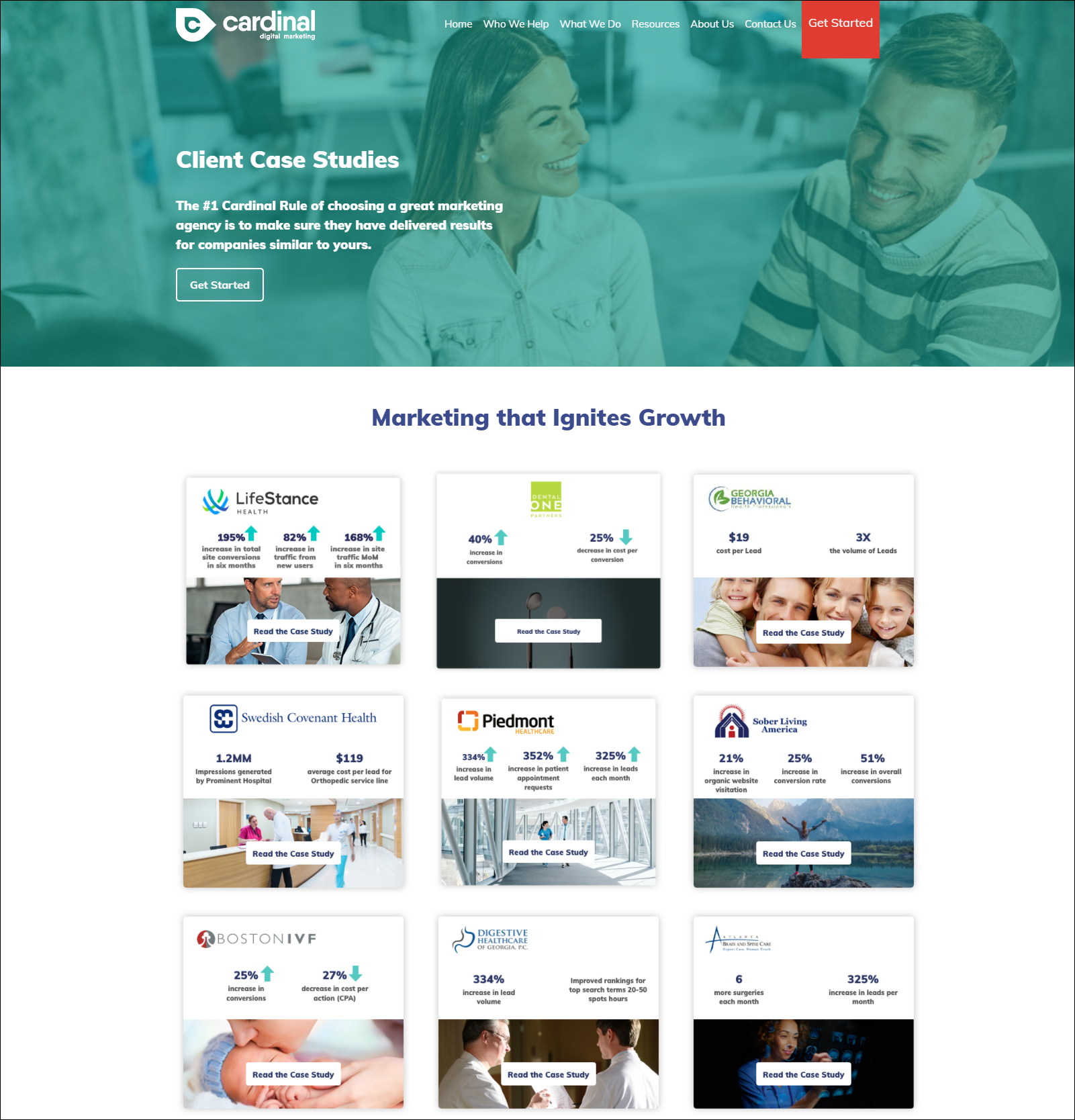Digital marketing agencies are like a box of chocolates. Only, you do have some control over what you get. It just takes a more complete understanding of the types of digital marketing agencies that are out there, how they work, and which is the best likely fit based on your specific needs. Take it from us: it’s not always a good fit, and that’s okay!
In the spirit of finding a good fit, however, we’ve put together a short guide to making sure the next digital marketing agency you decide to work with actually delivers. We’ve tailored this guide to the needs of healthcare organizations, specifically.
Questions we aim to answer for you:
- How do I pick the best digital marketing agency?
- What makes one agency better than another?
- How do I ensure my next digital marketing agency isn’t a dud?
- What are common warning signs of a bad agency?
- How do I know that I’ll work with the best in the industry?
- What questions should I ask to understand an agency’s working relationship?
Step 1: Be Clear About Your Own Goals
As rudimentary as “know thyself” might seem, it’s also one of the most overlooked—or at least underappreciated—parts of finding the right digital marketing agency. This is especially true in healthcare, where business goals will depend not only on an organization’s size, but their particular healthcare vertical, competition, and market.
As a general rule, vague, pie-in-the-sky marketing goals are poor starting points for agency relationships. Step one is to get a lot more specific than, “we need SEO,” or “we need digital advertising.” What are the outcomes you’d like to achieve with those particular activities? The point is to narrow the focus as much as possible, for example:
- We want more leads, but can’t exceed a specific cost-per-acquisition
- We need to launch a PR, marketing, and digital advertising campaign to support the launch of a new service offering to generate awareness
- We need a specific volume of new leads/patients for our multi-location dental group to be profitable
- We need a full overhaul of our website and digital listings to align new acquisitions with our parent company while using SEO best practices that will increase our brand’s search visibility
Most likely, you’ve already attempted to achieve these goals, either with your in-house team or another agency. Ask yourself why you need the support of a new digital agency. What problems will a digital agency help you solve (and how), for instance:
- Not getting expected results from the internal team (what are the results you were hoping for?)
- Do not have in-house expertise for a specific tactic
- Scaling and need more horsepower
- Need to refine marketing execution / take it to the next level
Bring in internal stakeholders to talk through this first step and, most importantly, memorialize what you come up with. That document can serve as a kind of RFP that helps focus your search for the right agency.
Step 2: Determine if You Need a Full-Service or Specialized Marketing Agency
A big part of finding the right fit is figuring out if you need a full-service or specialized agency. Both have pros and cons, and both can deliver strong results under the right circumstances. Which one you choose for your healthcare organization will depend, in large part, on your organization’s size, existing in-house skills, and budget.
What is a full-service agency and who’s it for?
As the name suggests, a full-service agency is equipped with the personnel, technical expertise, tools, and infrastructure to handle all the aspects of a traditional in-house marketing program. Go this route if you want to hand over the marketing keys to a trusted partner capable of guiding and executing on your behalf.
Typically, full-service agencies are integrated with your organization, either completely or in a hybrid form with existing in-house employees. They ought to be capable of planning, strategizing, building, executing, and reporting on everything from high-level brand positioning to your website, social media channels, and SEO.
Pros
- Comprehensive, consistent, and convenient
- One point of contact
- Deep industry expertise
- Can replace an in-house team and act as your main marketing engine
Cons
- Jack of all trades, master of none – make sure they can fulfill the services in-house with reliable resources
- Usually more expensive than specialized services
- Longer onboarding time and orientation
- A longer-term commitment that sometimes includes upselling
What is a specialized agency and who’s it for?
Sometimes, you just need help with one particular deficiency or marketing goal. When you don’t need the whole kit and kaboodle, it might make more sense to find a specialized agency that only focuses on the area of digital marketing you need.
These days, you can find agencies for a wide variety of marketing specialties, including:
- Graphic and web design
- Web development and website building
- Search engine optimization (SEO)
- Display advertising
- Public relations (PR)
- Social media management
- Content writing and ad copywriting
- Conversion rate optimization (CRO)
- Email marketing
- Video
Pros
- More agile and flexible
- Can get up and running quickly
- Often less expensive than a full-service contract
- Dedicated to performance and specifically demonstrating investment ROI
- Deep expertise in a given specialty area, including the latest marketing innovations
Cons
- Lack of cohesion with other marketing ops
- Multiple points of contacts if you work with several agencies
Step 3: Understand How to Evaluate a Digital Marketing Agency For Your Healthcare Organization
Once you put your toes in the water to check the temperature, you’ll soon find that there are a lot of agencies out there. In fact, there are a lot of healthcare-specific marketing agencies these days (ourselves included). This means your phone might soon be ringing off the hook with suitors.
Here are some indicators to help you separate the wheat from the chaff:
Experience in healthcare. Why not narrow your focus to only agencies with a track record of meeting the unique considerations of healthcare marketing? Do they understand regulatory requirements for advertising, HIPAA regulations, patient review generation, etc.? Do they have a solid understanding of the patient journey? Bonus points if you can find agencies that specialize in your particular healthcare field (plastic surgery, dentistry, etc.).
Case studies. Can the agency provide recent case studies that demonstrate its track record of delivering success in your healthcare space? A good agency ought to be able to demonstrate how it has helped organizations like yours with similar marketing challenges. You can take a look at ours.

Experienced team. Poke through website bios and LinkedIn pages. How experienced is the team? Ask about the average client tenure. You’re looking for the right team members for your specific needs.
Results-driven approach. It’s very easy to promise the world, especially in the world of healthcare marketing. Avoid being sold a bill of goods by asking your agency to share how they measure, track, and report on progress. Ask about healthcare metrics, such as patient acquisition cost (PAC). Finally, get a good idea of their reporting process.
Focus on Value, Not Price. It’s true: good marketing gets results that pay for themselves. When you focus on finding the cheapest agency, you may be setting yourself up for frustrations and poor ROI. Generally speaking, cut-rate agencies are poorly run, inexperienced, and don’t prioritize or value your business. Look at the value an agency can bring you – is the higher agency retainer worth it because this partner is focused on leads & patients instead of impressions & clicks?
Step 4: Know the 5 Warning Signs of a Bad Marketing Agency

If you’ve ever been burned by an all-squeeze, no-juice agency in the past, these five warning signs probably sound familiar:
- They overpromise. Anyone who promises overnight results (you know, “Top of Google in one month”) is probably full of it. Most good marketing programs take some time, effort, and tinkering to be successful.
- They can’t provide case studies that relate to what you need. With so many choices out there, why risk going with an agency that doesn’t have experience in your space? An agency’s portfolio speaks volumes.
- They’re vague about how they measure, report, and communicate marketing results. Pin your agency down on this. Err on the side of agencies that prioritize transparency and accountability.
- They can’t provide insight into their strategic approach. When resources are limited and dollars are on the line, you don’t want an agency that just wings it. You want structure and formalized strategy that’s well-articulated, documented, and easy to understand.
- They don’t give you access or keep you out of your own accounts. Some agencies, under the guise of “leave it to us—you’ll only screw something up,” won’t give you access to marketing accounts. Besides being wholly untransparent, it runs afoul of best practices. What happens if the relationship sours or the agency ghosts you? You’ll have a headache on your hands trying to regain access. Run from those shops as quickly as possible.
Getting it Right Means Knowing What to Look For
We’ve given you the warning signs. We’ve broken down the various solutions available to healthcare organizations. And we started it all with the age-old principle: know thyself. Ultimately, the right agency is going to invest a lot of time in getting to know you—your business, your consumers, and your specific goals. They’ll set up goals, tracking, and reporting. They’ll help you onboard with new technology and software. And they’ll build rock-solid campaigns and strategies from the ground up. When you find an agency that can do all that—and that threads a spirit of accountability and transparency throughout—you’ll be in very good shape.

